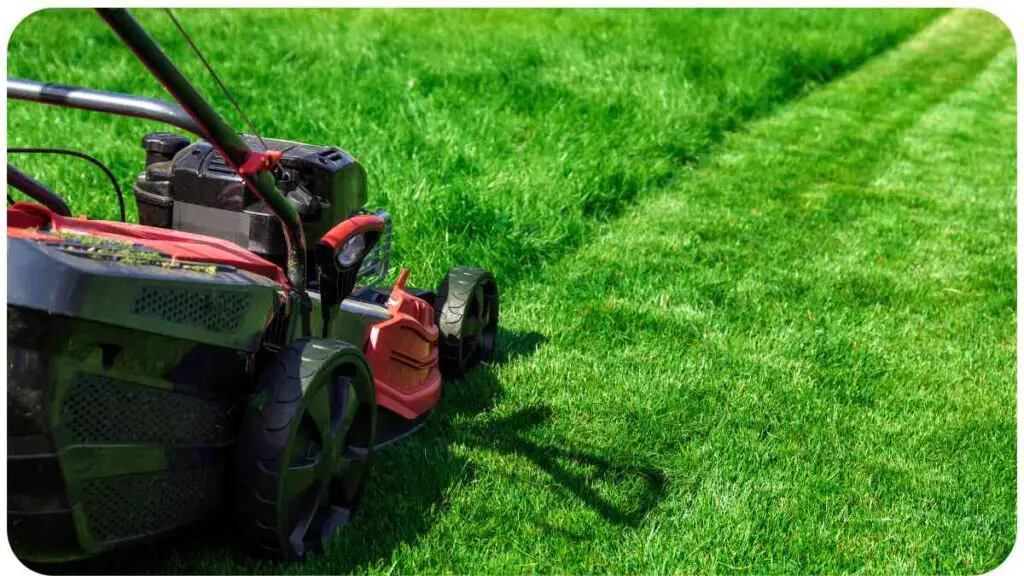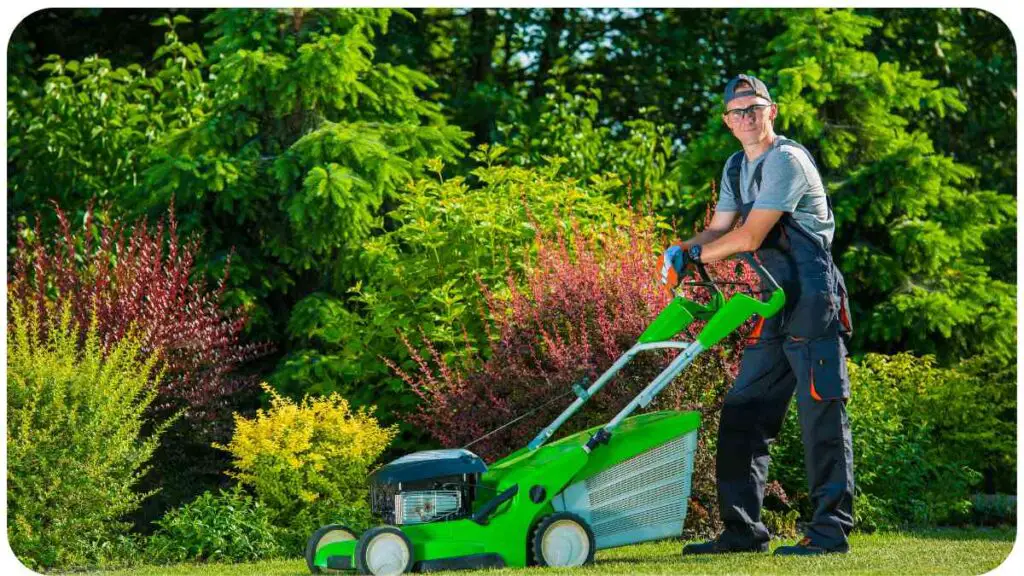Wondering why mowing the lawn sometimes leaves you with a sore throat? Uncover the reasons behind this common woe and explore practical solutions in this updated guide.
Discover the factors contributing to post-mowing throat irritation and learn effective strategies to keep your outdoor activities throat-friendly.
If you’ve ever had your lawn mower overheat on you, you know it can be frustrating. Our post on Can Lawn Mowers Overheat? My Experience shares one owner’s experience and some tips on preventing mower overheating.
| Takeaways |
|---|
| Sore throat while mowing the lawn can be caused by allergies, dryness, and exposure to dust, dirt, and toxic chemicals. |
| Protective gear like dust masks, lawn care practices like mowing during low pollen counts, and proper hydration can help prevent sore throat while mowing the lawn. |
| Grass allergies are a common cause of sore throat while mowing the lawn, and it is essential to manage your allergy symptoms effectively. |
| If you experience symptoms of exposure to toxic chemicals like nausea, headache or difficulty breathing while mowing, seek medical attention immediately. |
| Monitor your symptoms carefully and seek medical help if your sore throat continues even when you are not mowing the lawn. |
Can Mowing Lawn Cause Sore Throat? Understanding the Risks

Mowing lawns, surprisingly, can take a toll on your throat. A sore throat, marked by irritation in the mouth and throat lining, often follows this seemingly innocuous activity. While the primary culprit is the fumes emitted by engines and exhaust, other contributing factors exist.
Identifying the Culprit: Is Your Lawnmower to Blame?
If you find yourself grappling with a sore throat post-lawnmowing, your trusty lawnmower might be the source. The fumes generated during operation can irritate not only your lungs but also the esophagus, the vital tube linking your mouth to your stomach. Uncover the signs that your lawnmower is impacting your respiratory health.
“If you often experience allergies while mowing the lawn, our article can help you understand the triggers and precautionary measures you can take to minimize allergy symptoms in the future.”
Is Mowing Lawn Bad For Your Throat? Unraveling the Causes
Undoubtedly, mowing the lawn can indeed lead to a sore throat. The prevalence of dust and dirt in the air, coupled with the dryness characteristic of the cold season, contributes to this uncomfortable aftermath.
If your yard is like most, it likely harbors a wealth of pollen and other allergens that pose a threat to your throat health. Before succumbing to the urge to alleviate that tickle or scratchy sensation, let’s delve into the underlying factors causing this post-mowing discomfort.
Does Mowing Lawn Cause Sore Throat? Unveiling the Connection
Undoubtedly, mowing lawns can be a catalyst for sore throats. The act of tending to your lawn exposes you to various factors that may leave your throat feeling irritated and uncomfortable.
Proactive Prevention Strategies: If you find yourself facing the prospect of mowing your lawn and want to ward off the looming threat of a sore throat, there are several actionable steps you can take. Stay tuned for insightful tips on minimizing the risk and ensuring a more throat-friendly lawn care routine.
Preventing Sore Throat After Lawn Mowing: Essential Measures

Shielding yourself from the potential hazards of lawn mowing can significantly reduce the risk of a sore throat. Here are proactive steps to incorporate into your routine:
- Protective Gear: Ensure comprehensive coverage by wearing a mask or respirator to safeguard against dust particles. Additionally, don goggles or safety glasses atop your protective gear to shield your eyes from dust ingress.
- Opt for Electric or Battery-Operated Mowers: Consider switching to electric or battery-operated lawn mowers to mitigate fume exposure. These alternatives emit fewer pollutants, thereby reducing the likelihood of respiratory issues like asthma attacks.
“Maintaining a healthy lawn is crucial for good health, including prevention of sore throat issues. Our landscape advice article discusses effective lawn care strategies that can keep your lawn healthy and reduce the likelihood of experiencing a sore throat while mowing.”
Is Mowing The Lawn Good For Your Throat? Balancing Benefits and Risks
Engaging in lawn mowing does offer notable advantages, serving as both a form of exercise and a means to enhance respiratory well-being. Here’s a closer look at the dynamics involved:
- Exercise Benefits: Mowing the lawn provides a valuable opportunity for physical activity, contributing to overall fitness. The rhythmic movements involved in pushing or operating a lawnmower can be beneficial for cardiovascular health.
- Improved Breathing: Inhaling fresh air during mowing can be invigorating. It may aid in clearing the throat of lingering bacteria or viruses, potentially promoting respiratory health.
- Low Impact Activity: Reassuringly, mowing is considered a low-impact activity, meaning it imposes minimal stress on the throat and body. This characteristic makes it a generally safe and accessible outdoor chore.
Does Mowing The Lawn Cause Sore Throat? Unveiling the Factors
Undoubtedly, mowing the lawn can be a potential trigger for sore throats, influenced by various on and off-property elements. Explore key considerations that may contribute to post-mowing throat discomfort:
- Lack of Safety Equipment: Failing to don proper safety gear, including ear protection and a face mask, heightens the risk of infection-related complications. Discover the importance of protective measures to safeguard your respiratory health during lawn maintenance.
- Allergies and Asthma: Individuals with allergies or asthma face heightened susceptibility to throat soreness when exposed to outdoor irritants like pollen. Uncover the connection between these pre-existing conditions and the exacerbation of throat discomfort during outdoor activities.
What Causes Sore Throats After Mowing The Lawn? Unraveling the Triggers

Sore throats post-lawn mowing can stem from a variety of factors, each warranting attention. Delve into the potential culprits contributing to throat discomfort after tending to your lawn:
- Bacterial Infection: The most prevalent cause is a bacterial infection, often originating from bacteria in saliva that find their way to the throat during swallowing. Explore how these infections can manifest after mowing and the associated symptoms.
- Viral Infections: Viruses also stand as potential contributors to post-mowing sore throats. Understand how exposure to viral agents during outdoor activities may lead to throat irritation.
- Allergens: For individuals prone to allergies, exposure to allergens like pollen during lawn mowing can trigger soreness in the throat. Learn how to identify and manage allergic reactions for a more comfortable mowing experience.
- Chemical Exposure: Certain chemicals present in the air, such as herbicides used in lawn care, pose a potential risk. Explore how these substances may contribute to throat discomfort and ways to minimize exposure.
Preventing Sore Throat After Lawn Mowing: Practical Guidelines
Minimizing the risk of a sore throat after mowing involves adopting proactive measures. Consider the following practical guidelines to ensure a healthier post-mowing experience:
- Frequent Hand Washing: Regularly wash your hands to remove dirt and bacteria, reducing the likelihood of infections in the mouth or throat.
- Avoid Smoking and Alcohol: Steer clear of smoking and alcohol consumption while mowing. These habits can irritate the throat, potentially leading to infections or discomfort that hinders normal breathing patterns.
- Opt for Mild Foods: Before and after mowing, choose milder food options, such as chicken soup, over spicy dishes. Spicy foods can exacerbate sore throats, particularly if there’s an existing infection.
- Limit Talking During Mowing: Keep conversations short to minimize the inhalation of dust from freshly cut grass. Consider wearing a mask over your mouth and nose to further reduce dust exposure.
“One crucial aspect of lawn maintenance is changing the oil in the lawn mower regularly. For expert guidance on how to do this, check out our expert answer article on lawn mower maintenance.”
When to Consult a Doctor for Post-Mowing Sore Throat: Recognizing Red Flags
While many sore throats resolve on their own, certain circumstances warrant prompt medical attention after mowing the lawn. Consider these indicators that it’s time to consult a healthcare professional:
- Persistent Symptoms: If your sore throat persists beyond a few days and shows no signs of improvement, seeking medical advice is prudent.
- Additional Symptoms: Presence of additional symptoms such as fever, chills, or ear pain alongside the sore throat could indicate an underlying infection. Prompt medical evaluation is crucial in such cases.
- Accompanying Illness: If your sore throat coincides with symptoms of colds or flu-like illnesses, including headaches and muscle aches, consulting a doctor becomes essential for a comprehensive assessment.
Relief Strategies for Sore Throat After Lawn Mowing: Tried and Tested Remedies
If you find yourself grappling with a sore throat post-lawn mowing, consider these effective remedies to alleviate discomfort:
- Humidifier Use: Incorporate a humidifier in your home to add moisture to the air. The steam generated can coat the throat, providing relief from dryness and pain.
- Soothing Lozenges or Hard Candies: Opt for lozenges or hard candies containing sugar or honey. These create a protective layer on the tongue and throat, reducing irritation for several hours.
- Cough Drops or Sore Throat-Specific Candy: Explore the benefits of cough drops or candies designed specifically for sore throats. These offer relief without the sweetness of traditional options like lollipops or sucker sticks.
- Hot Tea with Honey: Substitute coffee or sodas with hot tea sweetened with honey. This combination not only helps clear irritants from the nose but also provides relief from dehydration, a common concern when consuming liquids without sufficient food intake.
“Mowing wet grass can cause issues with your lawn mower, and it can also impact your health. To learn more about the effects of wet grass on lawn mowers and how it can cause sore throat issues, check out our landscape advice article on the subject.”
Effective Home Remedies for Soothing Sore Throats After Lawn Mowing
Combat the aftermath of mowing-related sore throats with these home remedies designed to provide relief:
- Nighttime Humidification: Introduce a humidifier to your bedroom at night. By adding moisture to the air, humidifiers facilitate easier breathing while lying down. They also prove beneficial for relieving nasal congestion triggered by dry air, sinus infections, colds, and allergies. Note: Avoid using a humidifier near individuals with asthma or other lung conditions to prevent potential triggers.
- Nasal Decongestants: Consider the use of nasal decongestants like Afrin® Nasal Spray (oxymetazoline) or Sudafed PE® (pseudoephedrine). These medications temporarily reduce swollen nasal membranes, enhancing ease of breathing. It’s important to note that while effective for congestion, they do not treat viral infections like influenza or rhinovirus.
- Avoidance of Irritants: Steer clear of alcohol, caffeine, and cigarette smoke to facilitate easier breathing during persistent coughing. Eliminating exposure to these irritants can contribute to a more comfortable recovery.
- Hydration with Water: Ensure ample water intake to help thin mucus, promoting better drainage from airways. However, opt for cool or room temperature water, avoiding hot liquids like tea or coffee that may potentially irritate sensitive tissue in the mouth and throat.
Identifying Sore Throat Symptoms: A Comprehensive Overview
Recognizing the signs of a sore throat is crucial for timely intervention and management. Keep an eye out for the following common symptoms:
- Painful Swallowing: The hallmark symptom of a sore throat is pain during swallowing. This discomfort can range from mild to severe.
- Red and Swollen Throat: Visual cues such as a red, swollen throat and tonsils may accompany the soreness. Tenderness to the touch is also possible.
- Difficulty Swallowing (Dysphagia): Difficulty swallowing, known as dysphagia, may occur. This sensation can make it challenging for individuals, especially children, to swallow foods or fluids, potentially leading to complications such as dehydration if not promptly addressed.
- Fever or Feeling Hot: Sore throats may be accompanied by fever or a heightened sensation of warmth. In some cases, chills may also be present, albeit less commonly.
- Headache: While less common than fever, headaches can be associated with certain infections causing a sore throat.
- Loss of Appetite: Due to the discomfort caused by eating, individuals with sore throats may experience a loss of appetite.
“Overheating can cause significant damage to lawn mowers, leading to the risk of sore throat issues while mowing the lawn. Our experience article discusses the mechanisms behind lawn mower overheating and provides helpful tips on how to avoid this problem.”
Effectively Treating a Sore Throat Post Lawn Mowing: Practical Strategies
To alleviate the discomfort of a sore throat resulting from lawn mowing, implement the following practical strategies for a speedier recovery:
- Humidifier Use at Night: Employ a humidifier in your bedroom at night. This helps add moisture to the air, soothing the throat and facilitating better breathing.
- Hydration with Water: Ensure consistent water intake throughout the day. Opt for water over sugary drinks to prevent exacerbating the sore throat. Adequate hydration aids in relieving discomfort and supports the healing process.
- Ample Rest: Prioritize rest by staying in bed for at least 24 hours after the initial onset of pain or discomfort, unless advised otherwise by a medical professional. Taking time off work, if possible, contributes to a more comfortable recovery by easing discomfort and reducing swelling in the throat lining.
- Avoid Smoking and Alcohol: Steer clear of smoking and alcohol consumption during the recovery period. Both are recognized irritants that can worsen symptoms, especially when combined with the specific injury type associated with a sore throat.
Guidance for Parents: Addressing Your Child’s Sore Throat
As a concerned parent dealing with your child’s sore throat, follow these essential steps for their well-being:
- Contact the Pediatrician: Initiate contact with your child’s pediatrician promptly. Professional evaluation is crucial to determine whether the sore throat is linked to strep throat or another cause.
- Prioritize Rest and Hydration: Regardless of the diagnosis, ensure your child gets ample rest and stays well-hydrated. These measures support the healing process and alleviate discomfort.
- Caution with Medications: Refrain from administering over-the-counter pain relief medications like aspirin or ibuprofen to your child without the guidance of a healthcare professional. Additionally, avoid giving cough medicines, as they may irritate the throat and potentially worsen symptoms.
Preventing Sore Throats After Lawn Mowing: A Comprehensive Guide
Mowing the lawn is a common outdoor activity, but it can lead to sore throats if proper precautions aren’t taken. Understanding the causes and implementing preventive measures are crucial. Here’s a comprehensive guide to help you prevent sore throats after mowing the lawn:
Why It Happens:
- Cuts and Scrapes: Working with sharp or even dull blades can result in cuts and scrapes, making the throat vulnerable to irritation.
- Flying Clippings: Clippings kicked up into the air by passing cars and other lawnmowers pose a risk. Inhaling these tiny particles can irritate or inflame mucous membranes, including those around the vocal cords.
Preventive Measures:
- Wear Protective Gear: Equip yourself with a mask to prevent inhaling dust and particles. Goggles or safety glasses provide additional protection for the eyes.
- Proper Respiratory Protection: Use a mask or respirator to cover the mouth and nose, ensuring dust particles don’t enter the respiratory system.
- Choose Electric or Battery-Operated Mowers: Opt for electric or battery-operated lawn mowers instead of gas-powered ones. They produce fewer fumes, reducing the risk of respiratory problems.
- Hand and Face Coverage: Maintain consistent coverage of hands and face with protective gear to prevent dust entry into the mouth and lungs.
- Hydration: Stay adequately hydrated to prevent dryness in the throat. Proper hydration helps in minimizing irritation.
Additional Tips:
- Change Mowing Practices: Consider mowing during periods of low pollen counts to reduce exposure to allergens.
- Monitor Allergy Symptoms: If prone to grass allergies, monitor and manage allergy symptoms effectively.
Ensuring a Sore Throat-Free Lawn Mowing Experience: Practical Steps
To safeguard yourself from the risk of a sore throat after mowing lawns, follow these practical steps to create a protective routine:
- Wear a Mask: Prioritize respiratory protection by consistently wearing a mask. This crucial gear prevents the inhalation of dust and particles, reducing the risk of throat irritation.
- Hand Hygiene: Wash your hands thoroughly before mowing the lawn, especially if you’ve handled chemicals or fertilizers. This practice minimizes the transfer of dirt and bacteria to the mouth or throat.
- Facial Cleansing: Before and after mowing, cleanse your face with soap and water. This helps remove any accumulated dust or allergens, promoting a cleaner and irritation-free environment.
- Hair Maintenance: After mowing, wash your hair with shampoo to eliminate any clippings. This preventative measure reduces the risk of fungal infections from potential contaminants in the clippings.
- Rinse Your Mouth: Post-mowing, rinse your mouth with water. This action aids in removing any particles that may have entered the mouth during the process.
- Hydration: Drink an ample amount of water after mowing to prevent dehydration, especially if sweating occurred. Proper hydration is essential for maintaining throat health and reducing the risk of sore throat, particularly when combined with factors like allergies.
- Minimize Pollen Exposure: Be cautious of pollen exposure while breathing outdoor air. Install a screen door to mitigate the risk of inhaling allergens through open windows or doors, especially in high-temperature conditions.
Conclusion
In conclusion, while mowing the lawn offers its benefits, ensuring throat health requires diligent precautions. Here’s a recap of key points to remember:
- Protective Gear: Prioritize your respiratory health by donning a mask and goggles while mowing. These simple yet effective measures shield you from potential irritants present in the yard.
- Avoid Irritants: Stay vigilant against lurking irritants in your yard. Be mindful of chemicals, pollen, and other allergens that may exacerbate throat discomfort.
- Natural Remedies: Should you experience a sore throat post-mowing, explore natural remedies like saltwater gargles or incorporating fresh fruits and vegetables into your diet. These remedies offer soothing relief and promote recovery.
By integrating these practices into your lawn mowing routine, you can enjoy the benefits of outdoor activity while safeguarding your throat health. Remember, proactive measures pave the way for a more enjoyable and throat-friendly mowing experience.
Further Reading
Grass Allergies: Symptoms, Diagnosis, and Treatment: This article provides comprehensive information about grass allergies, including symptoms, diagnosis, and treatment for allergy sufferers.
5 Reasons You May Struggle Through Grass Allergies: This article highlights common factors that may cause grass allergies to become worse and offers practical advice on how to alleviate symptoms.
Sick After Mowing? A Guide to Safe Lawn Care: This guide discusses how to stay safe while mowing the lawn and offers helpful tips on how to avoid common symptoms like sore throat or headache.
FAQs
What are the most common causes of sore throat while mowing the lawn?
Sore throat while mowing the lawn can be caused by several factors, including allergies, dryness in your mouth or throat, inhaling dust or dirt, and exposure to toxic chemicals or gasoline fumes.
Can allergies cause sore throat while mowing the lawn?
Yes, allergies are one of the most common causes of sore throat while mowing the lawn. Grass allergies can cause symptoms like sneezing, coughing, and sore throat, particularly during allergy season.
How can I avoid sore throat while mowing the lawn?
The best way to avoid sore throat while mowing the lawn is by wearing protective gear like a dust mask, drinking plenty of water to prevent dryness, mowing during the early morning or late evening when pollen counts are low, and using allergy medications as needed.
What are the symptoms of exposure to toxic chemicals while mowing the lawn?
Symptoms of exposure to toxic chemicals while mowing the lawn can include sore throat, headache, nausea, vomiting, dizziness, and difficulty breathing. Seek medical attention if you experience any of these symptoms after mowing.
How do I know if I’m experiencing sore throat from mowing the lawn or something else?
The best way to determine whether your sore throat is due to mowing the lawn or another cause is to monitor your symptoms carefully. If your sore throat occurs only after mowing or spending time outside, you may need to change lawn care practices or seek medical help. If your sore throat persists even when you are not mowing or spending time outside, consult your doctor for further evaluation.

For 15 years, Hellen James has worked in the gardening industry as an expert and landscape designer. During her career, she has worked for a variety of businesses that specialize in landscaping and gardening from small firms to large corporations.

